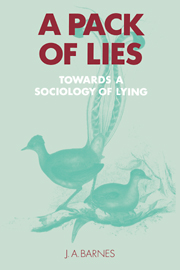Book contents
- Frontmatter
- Contents
- Preface
- Acknowledgments
- 1 What is a lie?
- 2 Where lies are expected
- 3 Ambiguous domains
- 4 Science
- 5 Cultural diversity
- 6 Relations
- 7 Self-deception and connivance in deceit
- 8 Telling and detecting lies
- 9 Benign untruths: the discourse of fiction
- 10 Evaluations
- 11 Do we have to have lies?
- References
- Index
3 - Ambiguous domains
Published online by Cambridge University Press: 29 August 2009
- Frontmatter
- Contents
- Preface
- Acknowledgments
- 1 What is a lie?
- 2 Where lies are expected
- 3 Ambiguous domains
- 4 Science
- 5 Cultural diversity
- 6 Relations
- 7 Self-deception and connivance in deceit
- 8 Telling and detecting lies
- 9 Benign untruths: the discourse of fiction
- 10 Evaluations
- 11 Do we have to have lies?
- References
- Index
Summary
COURTS AND POLICE
Warfare and politics occupy one end of the trust–mistrust spectrum; the other end might be assigned to academic references. At the mistrustful end we assume at least one side is being deceived, and that if a message happens to be true, it has been transmitted only in order to achieve deception more successfully at some later date. At the other end of the spectrum we assume that there is no intention to deceive, even if what has been written seems to be untrue. In between the two ends is a middle range where untrue messages are sometimes assumed to be lies and sometimes not. In her book Lying Bok lists several of these intermediate categories: statements made to protect others, or made to promote the public good, or told to the sick and dying. Some of the statements made to participants in experiments in social science are untrue and may be explained later when the experiment has been concluded. Bok discusses at length to what extent statements made in these various contexts are made with intent to deceive, and whether or not these lies are justified. Our interest however is less in the moral evaluation of these statements and more in the ways in which statements are classified as lies by others, including the persons to whom the statements are addressed.
- Type
- Chapter
- Information
- A Pack of LiesTowards a Sociology of Lying, pp. 36 - 54Publisher: Cambridge University PressPrint publication year: 1994

